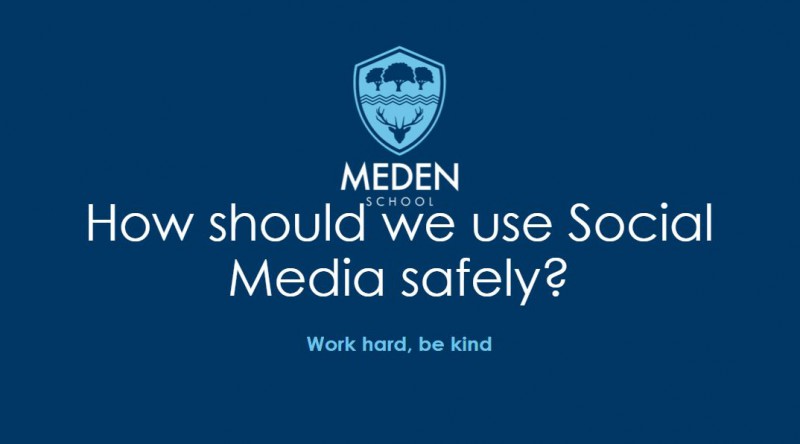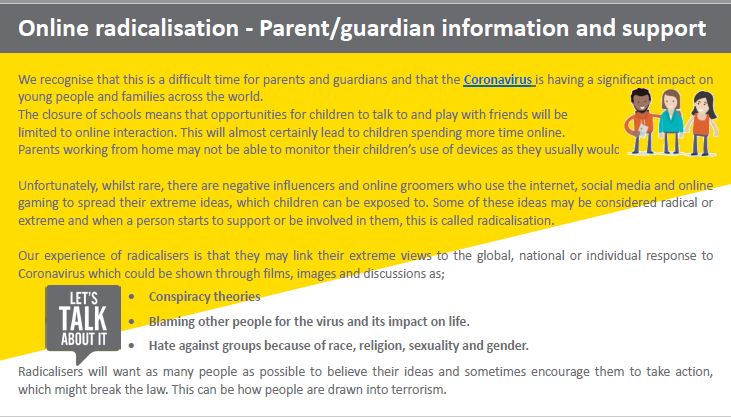E-Safety Information and Advice
Protecting your children online
The internet is a integral part of lives and an important and useful resource for all of us. With the development of new technology its availability and easy access has become a normal part of the lives of children and young adults. It is vital that we do all that we can to ensure the safe use of the internet and all work together on the issue of e-safety.
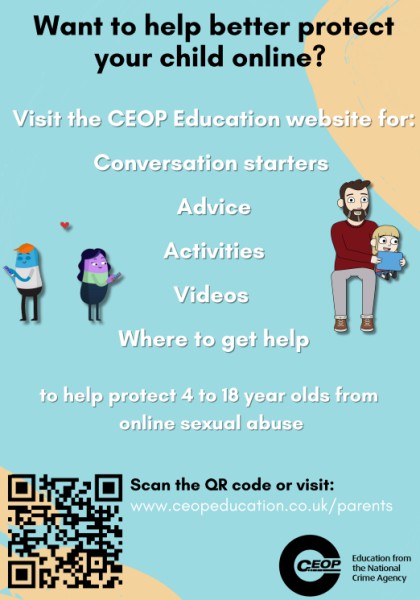
So how do we protect our child online?
At Meden School we do numerous sessions with the children on how they can stay safe online.
CLICK ON THE IMAGE BELOW to see an example of a session we have used with the students in school. You may find it useful to discuss this with your child.
Advice on how to set up Protection Controls through your broadband providers.
The 4 big internet providers in the UK - BT, Sky, TalkTalk and Virgin Media have come together to produce helpful video guides, which may help you to download and set up protection controls they offer. Full details can be found at
Guides to setting up Parental Controls by Provider (in no particular order)
BT
BT Parental Controls from UK Safer Internet Centre on Vimeo.
SKY
Sky Broadband Parent Controls from UK Safer Internet Centre on Vimeo.
Virgin Media
TalkTalk
OnLine Radicalisation....what you need to know!
Click for full document
Latest Letters from Nottinghamshire Safeguarding Children Board regarding 'Keeping Safe Online'
- Staying safe online leaflet
- Staying safe online leaflet to parents (in polish)
- Staying safe online letter to parents
Other Information
MONEY MULING
What is a Money Mule? A money mule is someone who transfers criminal money through their own bank account on behalf of someone else, they may be paid for doing so. Criminals use money mules to launder the profits of their crimes. This is money laundering.
Please see latest advice from the police - click for details
MOMO
You may have heard of ,or read in the media about MOMO, the latest thing in social media which is thought to have been created by hackers in an effort to gather personal information. MOMO targets young people on social media centering around a doll which essentially tries to get children to carry out dares, and encourages self-harm.
Guidelines from the National Online Safety organisation specifically on MOMO can be found by clicking the image below.
This website is an invaluable resource for parents and contains further information on most of the popular sites, our young people access on a daily basis.
Please visit www.nationalonlinesafety.com for full details
Free guides courtesy of the National Online Safety Team
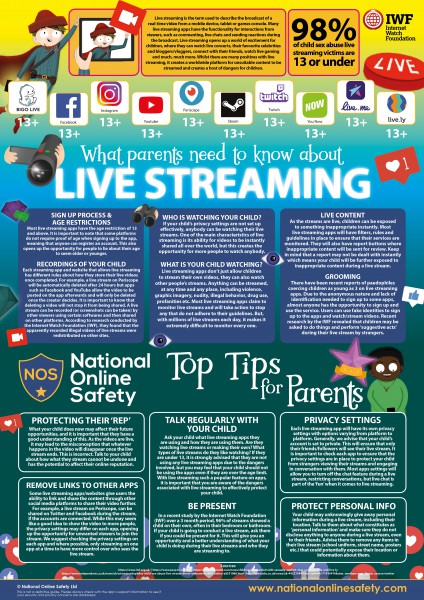 | Live Streaming - Parents Guide - please click to enlarge |
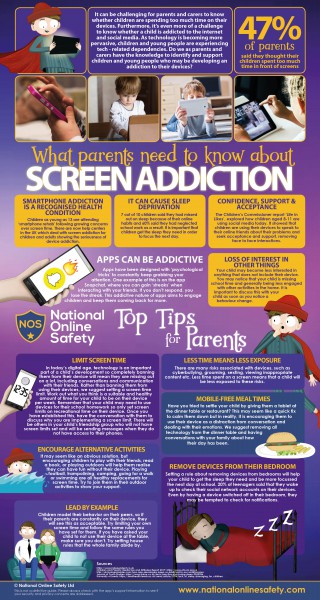 | Screen Addition - What is it? - please click to enlarge |
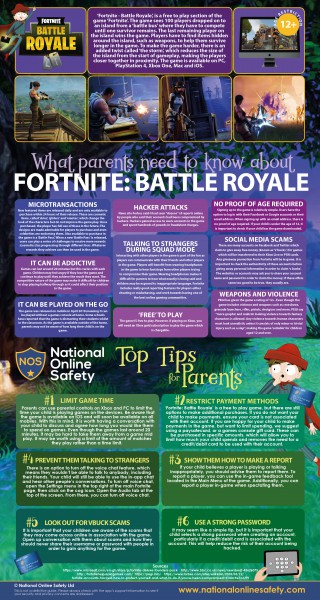 | Fortnite - does your child play Fortnite? Read this guide! - click to enlarge |
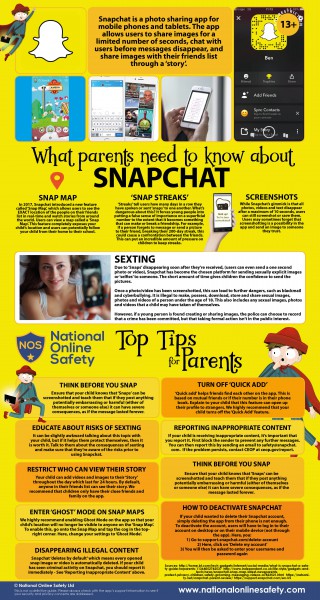 | Snapchat - everything you need to know! - click to enlarge Downloadable parent guide |
Internet facts
The following facts might surprise you...
- 94% of teenagers are on Facebook but Twitter and Instagram now have a faster growth rate in terms of teenage usage
- 70% of teenagers use a smartphone
- 38% of young people have been affected by bullying online
- 25% of a teenagers ‘friends’ online are people that they have only met online
E-safety in school
As part of our computing lessons all students spend their first few weeks investigating e-safety and all aspects of staying safe online. They are encouraged to report any negative issues they may encounter online to a trusted adult which includes all school staff. Our school police community support officers provide a ‘safety’ assembly which includes a focus on e-safety, cyber bullying and the possible consequences of inappropriate internet use.. Students are informed how to report cyber bullying and e-safety posters are displayed in prominent positions around school.
Social Networking
The use of social networking sites such as Facebook and Twitter are becoming increasingly popular. This is despite the fact that you have to be 13 years old in order to have a Facebook profile. There is a wealth of advice online about social networking sites. Please click on the links below for further support:
- http://www.nspcc.org.uk/preventing-abuse/keeping-children-safe/share-aware/
- http://www.childnet.com/young-people/secondary/need-help
- https://www.getsafeonline.org/social-networking/social-networking-sites/
- Facebook checklist (PDF)
- Facebook Guide for Parents [PDF]
- Video chats and webcams [PDF]
- Website promoting safety on most used sites (Facebook, Skype, Twitter, Youtube, Xbox 360): http://www.childnet.com/young-people/secondary/need-help
IN THE NEWS
- What 'Apps' does your child use? Latest article highlights the danger of an app called 'Oovoo' which young people sometimes download. For further details, please follow this link: http://www.mirror.co.uk/news/uk-news/oovoo-parents-claim-paedophiles-using-5261559
- Cyberbully: A chilling real-time thriller starring Maisie Williams - from Game of Thrones - as a teenager battling with an anonymous cyber-stalker. The plot of Cyberbully is inspired by dozens of real-life cases.
- NSPCC Share Aware Campaign Launch
- BBC News - Breck Bednar murder: Lewis Daynes sentenced to life in prison: A computer engineer is sentenced to life in prison for the murder of a 14-year-old boy he met through online gaming.
Top tips for students
- Don’t post any personal information online – like your address, email address or mobile number.
- Think carefully before posting pictures or videos of yourself. Once you’ve put a picture of yourself online most people can see it and may be able to download it, it’s not just yours anymore.
- Keep your privacy settings as high as possible
- Never give out your passwords
- Don’t befriend people you don’t know
- Don’t meet up with people you’ve met online. Speak to your parent or carer about people suggesting you do
- Remember that not everyone online is who they say they are
- Think carefully about what you say before you post something online
- Respect other people’s views, even if you don’t agree with someone else’s views doesn’t mean you need to be rude
- If you see something online that makes you feel uncomfortable, unsafe or worried: leave the website, turn off your computer if you want to and tell a trusted adult immediately.
Top Tips for Parents
- Talk to your child about what they’re up to online. Be a part of their online life; involve the whole family and show an interest.
- Encourage your child to go online and explore sites which are fun, educational and that will help them to develop online skills.
- Keep up-to-date with your child’s development online.
- Set boundaries in the online world just as you would in the real world. Think about what they might see, what they share, who they talk to and how long they spend online.
- Keep all equipment that connects to the internet in a family space.
- Know what connects to the internet and how. Make sure you’re aware of which devices that your child uses connect to the internet, such as their phone or games console.
- Use parental controls on devices that link to the internet, such as the TV, laptops, computers, games consoles and mobile phones.
Useful websites
- http://www.saferinternet.org.uk/
- http://safe.met.police.uk/index.html
- http://www.kidsmart.org.uk/
- https://www.thinkuknow.co.uk/
- http://www.nspcc.org.uk/help-and-advice/for-parents/online-safety/online-safety_wdh99554.html
- http://www.bbc.co.uk/webwise/topics/safety-and-privacy/internet-safety-for-kids/
- http://ceop.police.uk/
If you are concerned about anything online please use the following helplines:
Childline 0800 1111
If you are worried about a child and need some advice call 0808 800 5000

